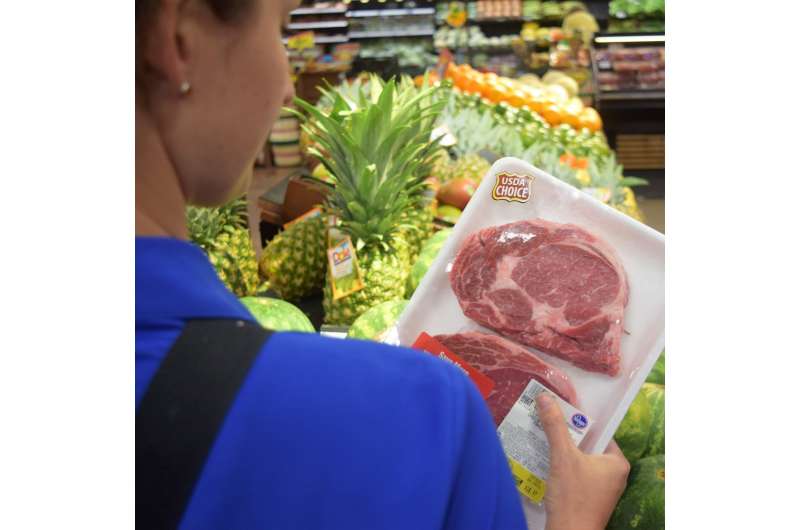November 14, 2017 report
Simulating a meat-free America

(Phys.org)—A pair of researchers affiliated with both Virginia Polytechnic Institute and the U.S. Department of Agriculture has conducted an intriguing exercise—simulating the impact on the American diet and changes in greenhouse gas emissions if animal food products were completely eliminated from production, consumption and sale in the US. In their paper published in Proceedings of the National Academy of Sciences, Robin White and Mary Beth Hall describe how they built their simulation and what was revealed by running it.
Over the past couple of decades, many inside and out of the science community have suggested that the United States and other countries would be better off if we all stopped eating animal products, e.g. meat, dairy, poultry, etc. Water and land used to grow animal feed, for example, could instead be used to grow human crop foods. Also, getting rid of all those animals would surely reduce the amount of greenhouse gases emitted, both from methane emitted directly from the animals and from exhaust emitted by tractors growing plants to feed the animals. But until now, no one has put this theory to the test. In this new effort, the researchers created their simulation by envisioning the U.S. as it is now, but without any animals grown to produce food products and no animal food products being imported into the country.
After entering statistics related to crops grown for feed, water used grow it, estimates of methane emitted and multiple other factors, the researchers ran the simulation and analyzed resulting data. Removing animals from the food business, they report, resulted in 23 percent more food grown for human consumption due to conversion of land currently used for feed production to crops for human consumption. But still, even with all that new food, the researchers also found that if all Americans switched to a vegan diet, there would be mass deficiencies in minerals, vitamins and fatty acids among the populace.
They also note that approximately 16 million people are employed in the animal food business, which they did not add to their simulation, but which would have to be accounted for in real-world estimations. They also found that there would be a reduction in greenhouse gas emissions (approximately 28 percent), but not as much as expected due to the need to synthesize fertilizers to replace those created by farm animals. They suggest their simulation shows that adopting a strategy to benefit society, even one that seems simple at the outset, may not be as clear-cut as it might seem.
More information: Robin R. White et al. Nutritional and greenhouse gas impacts of removing animals from US agriculture, Proceedings of the National Academy of Sciences (2017). DOI: 10.1073/pnas.1707322114
Abstract
As a major contributor to agricultural greenhouse gas (GHG) emissions, it has been suggested that reducing animal agriculture or consumption of animal-derived foods may reduce GHGs and enhance food security. Because the total removal of animals provides the extreme boundary to potential mitigation options and requires the fewest assumptions to model, the yearly nutritional and GHG impacts of eliminating animals from US agriculture were quantified. Animal-derived foods currently provide energy (24% of total), protein (48%), essential fatty acids (23–100%), and essential amino acids (34–67%) available for human consumption in the United States. The US livestock industry employs 1.6 × 106 people and accounts for $31.8 billion in exports. Livestock recycle more than 43.2 × 109 kg of human-inedible food and fiber processing byproducts, converting them into human-edible food, pet food, industrial products, and 4 × 109 kg of N fertilizer. Although modeled plants-only agriculture produced 23% more food, it met fewer of the US population's requirements for essential nutrients. When nutritional adequacy was evaluated by using least-cost diets produced from foods available, more nutrient deficiencies, a greater excess of energy, and a need to consume a greater amount of food solids were encountered in plants-only diets. In the simulated system with no animals, estimated agricultural GHG decreased (28%), but did not fully counterbalance the animal contribution of GHG (49% in this model). This assessment suggests that removing animals from US agriculture would reduce agricultural GHG emissions, but would also create a food supply incapable of supporting the US population's nutritional requirements.
Journal information: Proceedings of the National Academy of Sciences
© 2017 Phys.org




















